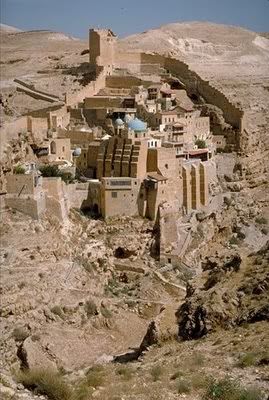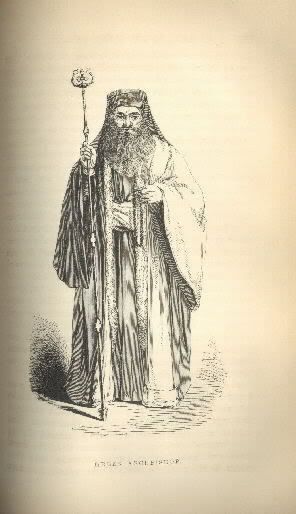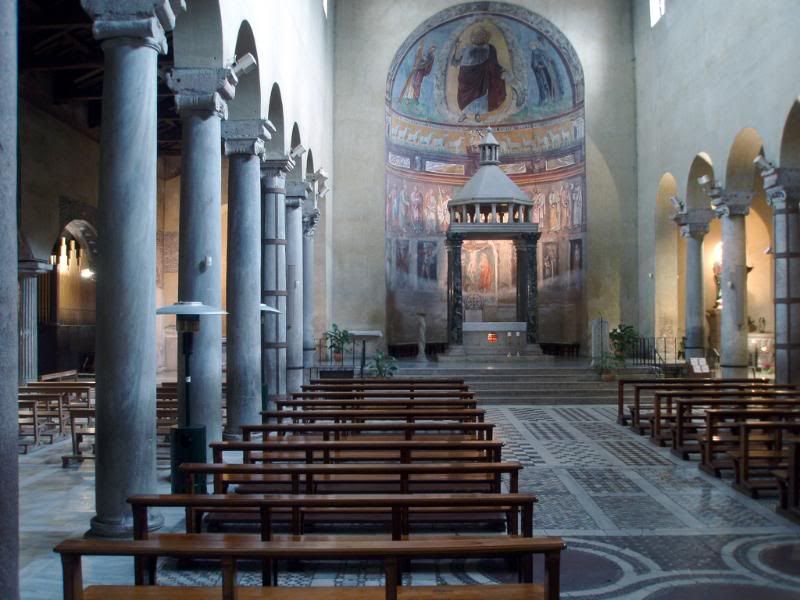 Saint Stephen trained under the tutelage of his uncle for nearly 15 years, after which, at age 24, Stephen was ordained. For eight years, her served his community as guestmaster and cantor. It is said that while he was celebrating mass on one occasion, Stephen raised the Eucharist, intoning the words, “Holy things to the holy.” Holy legend tells us that his cell was bathed suddenly in glorious light, and that from that moment on, whatever he prayed for during the Eucharist was granted. He came to be known as the “Wonderworker” due to his miraculous intercessions.
Saint Stephen trained under the tutelage of his uncle for nearly 15 years, after which, at age 24, Stephen was ordained. For eight years, her served his community as guestmaster and cantor. It is said that while he was celebrating mass on one occasion, Stephen raised the Eucharist, intoning the words, “Holy things to the holy.” Holy legend tells us that his cell was bathed suddenly in glorious light, and that from that moment on, whatever he prayed for during the Eucharist was granted. He came to be known as the “Wonderworker” due to his miraculous intercessions.Despite the respect of his brothers, and those who sought him out, Stephen felt drawn to the contemplative life, wishing to live in complete isolation as a hermit. His request was denied by his Superior, as he wished him to remain available for those seeking his miraculous intercessions and council. Stephen agreed to a compromise, living an isolated life during the week, and making himself available for spiritual counseling on weekends. He hung a sign on the door of his cell that read, “Forgive me, Fathers, in the name of the Lord, but please do not disturb me, except on Saturdays and Sundays." Despite his desire for isolation, Stephen’s gracious demeanor, humility, and piety made him an excellent spiritual counselor to his brothers and those who visited.
His biographer and disciple Leontius wrote about Stephen: "Whatever help, spiritual or material, he was asked to give, he gave. He received and honored all with the same kindness. He possessed nothing and lacked nothing. In total poverty he possessed all things."
Saint Stephen of Mar Saba was likely persecuted near the end of his life, as the Islamic faith began spreading through the region. The Saracens, spreading that faith, attacked many of his brethren, and many monks of Mar Saba were slain. Despite this growing threat, his heart remained strong in service to the Lord. While the details of his death are unknown, Stephen left behind a life rich with faith and miracles, a legacy of faith, and several hymns which demonstrate endurance in times of sadness.
Art thou weary, art thou languid,
Art thou sore distressed?
“Come to Me,” saith One, “and coming,
Be at rest.”
Hath He marks to lead me to Him,
If He be my Guide?
In His feet and hands are wound prints
And His side.
Hath He diadem, as monarch,
That His brow adorns?
Yes, a crown in very surety,
But of thorns.
If I find Him, if I follow,
What His guerdon here?
Many a sorrow, many a labor,
Many a tear.
If I still hold closely to Him,
What hath He at last?
Sorrow vanquished, labor ended,
Jordan passed.
If I ask Him to receive me,
Will He say me nay?
Not till earth and not till Heaven
Pass away.
Finding, following, keeping, struggling,
Is He sure to bless?
Saints, apostles, prophets, martyrs,
Answer, Yes!
Day 90 of 365
Prayer Intentions: Endurance; Those serving the Lord; Our brothers of the Islam faith tradition.
Requested Intentions: For Healing (A); The blessing of children (S); Safety of travelers (J); Improved family relationship with the Lord, using gifts for His glory (L); For a restorative, faith-deepening Lent for all those who are struggling (L).










0 comments:
Post a Comment
Thanks for leaving a comment. If you wish to submit a prayer request, however, please do so above, using the "Contact" tab.